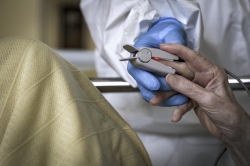Old Age: Our Future

Vatican City, February 9.- On February 9, 2021, the Pontifical Academy for Life, together with the Dicastery for Integral Human Development, publishes the document Old age: our future. The elderly after the pandemic.
Since the pandemic has engulfed the world, older people have been the hardest hit internationally. If, on the one hand, this is due to the inherent frailty of old age and the pathologies that accompany it, on the other hand the high number of victims cannot fail to raise the question of rethinking the entire assistance model, which needs to be corrected beyond the borders of individual states.
The new document that the Pontifical Academy presents, in agreement with the Dicastery for Integral Human Development, is meant to underline the urgency of a profound reflection that leads to a rethinking of the assistance model for the elderly, so that the individual and his or her situation become the main focus of health and social policies. The starting point of this model is the desire of every man and woman to enjoy the last season of life accompanied and supported by their families, in a habitat suitable for living the days of old age peacefully.
The Academy’s text proposes the concept of the healthcare “continuum” in which the individual person can be taken care of by a care system where the family is supported by new and innovative integrated models of care: home assistance, "neighborhood" health personnel, new models of family homes and cohabitation, services provided at home to encourage people to stay in their own homes. The current facilities that host the elderly have certainly constituted a reception proposal to meet a demand and a real need. Many religious-led institutions within the Church have been a real support for many in the time of weakness. But today we must start a frank and serious debate on the effectiveness and feasibility of new reception models.
With this document, the Pontifical Academy for Life takes up the reflection already started with the Note of March 30, 2020 (Pandemic and Universal Brotherhood), continued with the Note of July 22, 2020 (Humana Communitas in the Age of Pandemic: Untimely Meditations on Life’s Rebirth) and with the joint paper of December 28, 2020 in collaboration with the Dicastery for Integral Human Development (Vaccine for all. 20 points for a more just and healthy world). Its intention is to propose the way of the Church, teacher of humanity, to a world changed by Covid19, to women and men in search of meaning and hope for their lives.
A renewed attention towards the elderly and their relationship with grandchildren and new generations, to which Pope Francis calls everyone, must lead to a rethinking of the care of every man and woman who receives the gift of the blessing of a long life. It is not good to detach children and young people from constant contact with their parents and grandparents. As Pope Francis said on Sunday 31 January, announcing the institution of the World Grandparents and Elders Day, "grandparents are often forgotten and we forget this wealth of preserving the roots and transmitting them". And he added: “it is important that grandparents meet their grandchildren and that grandchildren meet their grandparents, because - as the prophet Joel says - grandparents will dream in front of their grandchildren, they will have illusions [great wishes], and young people, gaining strength from their grandparents, will go on, they will prophesy”.
A society that produces the "throwaway culture" needs the prophecy of the Church which, in its wisdom, points to the path of communion and closeness with successive generations, so that no one remains alone or is abandoned and so that those who are young learn that frailty is a talent and a wealth.
(Original text: Italian; translation by Leonardo Stefanucci, revised by Fabrizio Mastrofini)




